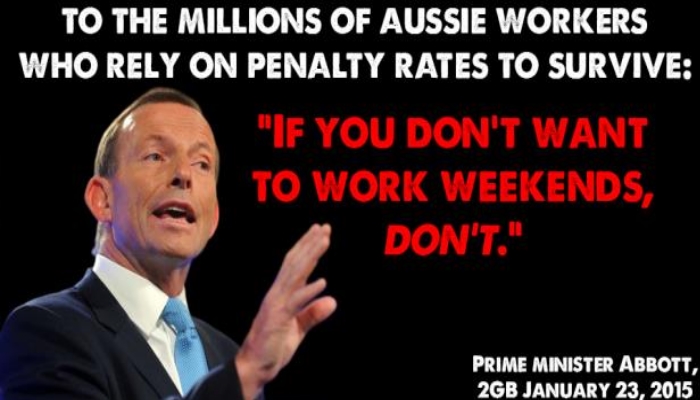
Cut Sunday penalty rates says Productivity Commission
The Productivity Commission (PC) has recommended that Sunday penalty rates be cut back, perhaps to Saturday levels, for at least for some groups of workers.
And it has proposed a new form of collective agreement for the small business sector – one that wouldn’t have the same safeguards that apply to current Enterprise Agreements.
The recommendations come in a draft PC report on current industrial laws, commissioned by the Abbott government.
The draft, released on 4 August, recommends that workers in the retail, entertainment and hospitality industries no longer be entitled to special rates on Sundays. It argues that for most people now there is little difference between working on a Saturday and working on a Sunday.
But unions have signalled that they will fight the proposal which would represent a pay cut for thousands of workers who already work in relatively low-paid jobs.
As for the new agreements, or “enterprise contracts”, the PC model would allow for these to be imposed on prospective employees as a condition of employment, without any need for negotiation – just like the old WorkChoices AWAs.
The Productivity Commission report says: "No employee ballot would be required for the adoption of an enterprise contract, nor would any employee group be involved in its preparation and agreement unless the employer wished this to be the case."
ACTU secretary Dave Oliver says the proposed contracts would allow employers "to put these contracts on the table on a take-it-or-leave-it basis where they could find themselves signing into something that trades away their penalty rates, shift loadings and rostering hours of work. That process will not be subject to any scrutiny."
"These individual arrangements are worse than WorkChoices in so far as they are providing templates to employers for wholesale migration out of the award," Mr Oliver said.
Workers would no longer be able to terminate an individual contract after giving 28 days' notice, but could be locked in for a minimum of 12 months under the Productivity Commission recommendations.
The Abbott government has said it would not introduce any such changes before the next election. But unions are now gearing up to make sure their members and their families understand what could be in store for them under a second Abbott government.










